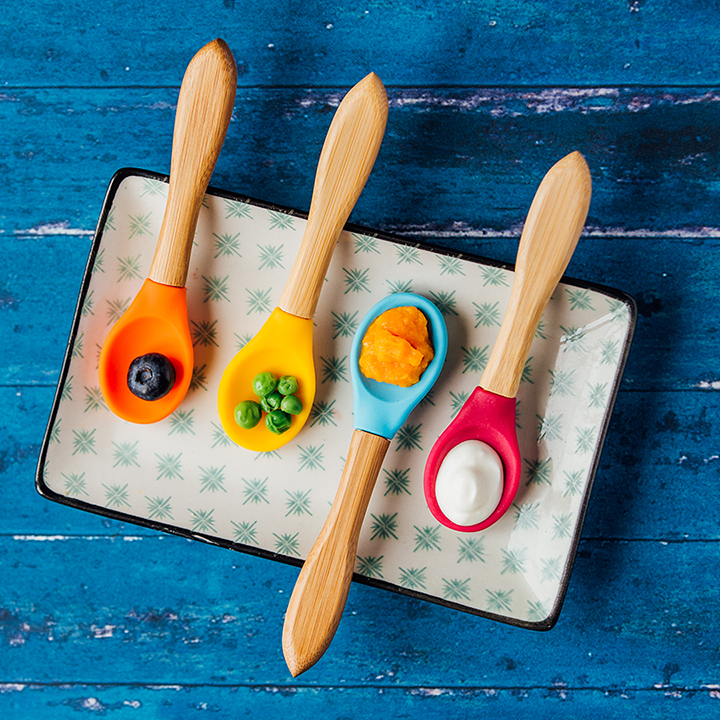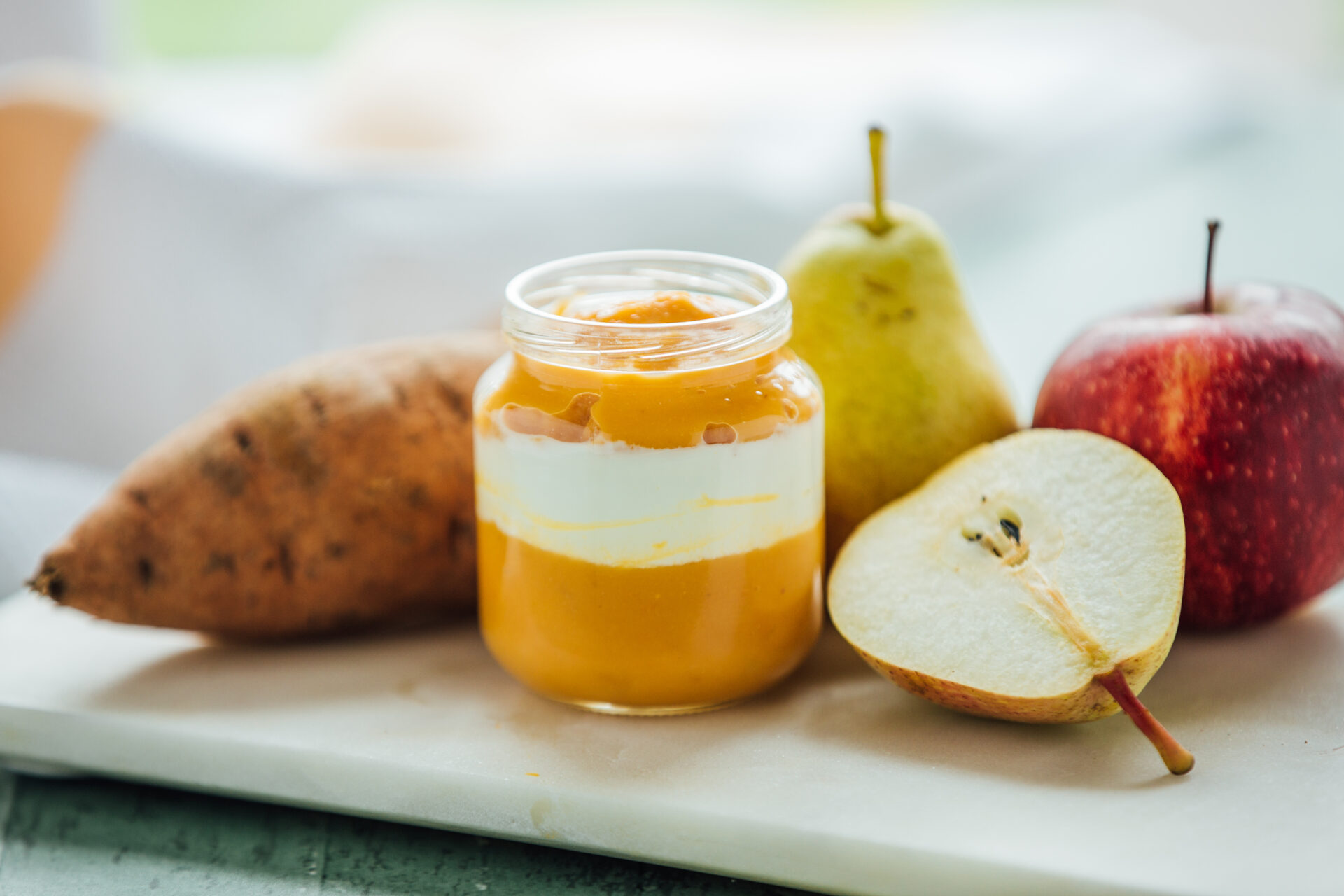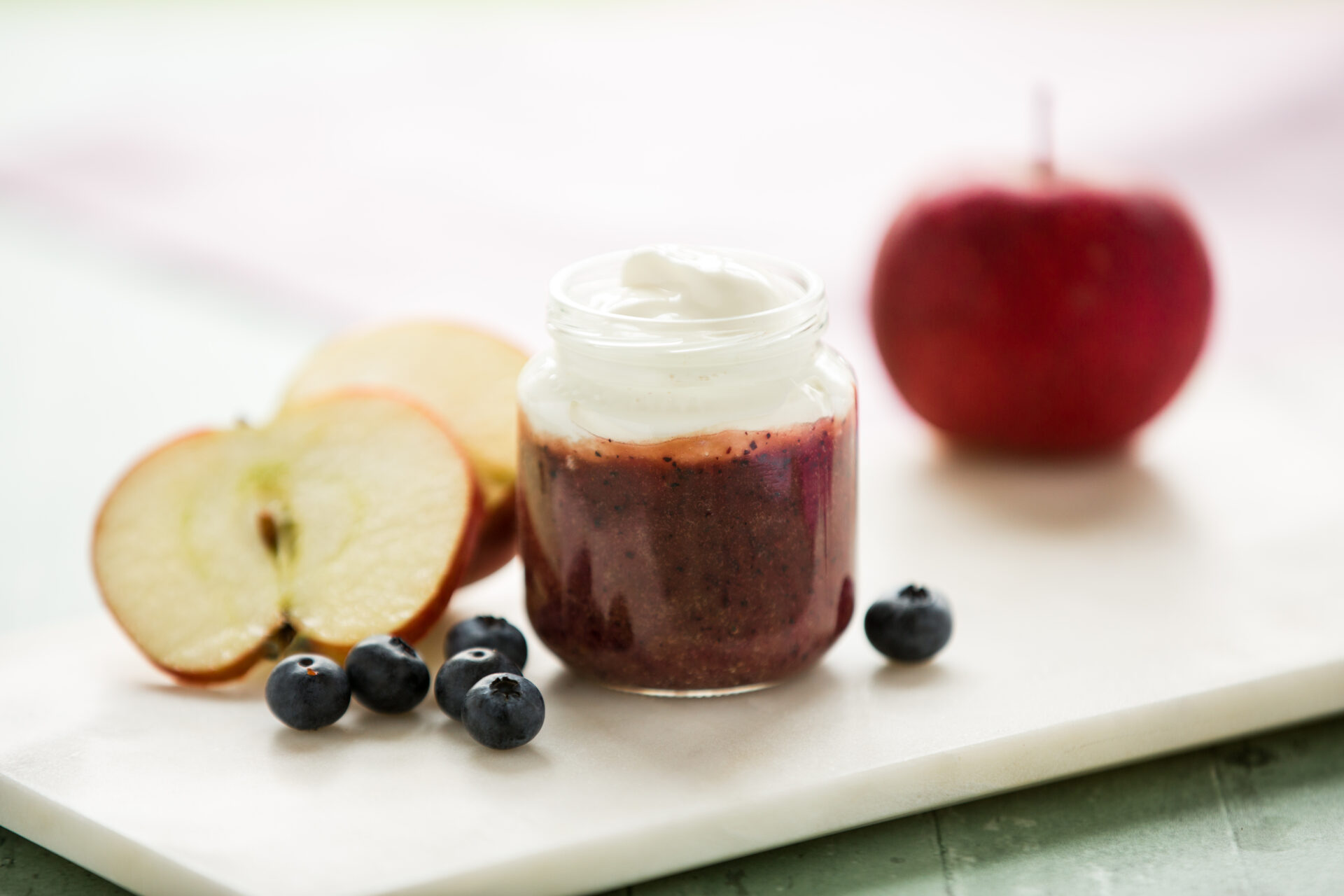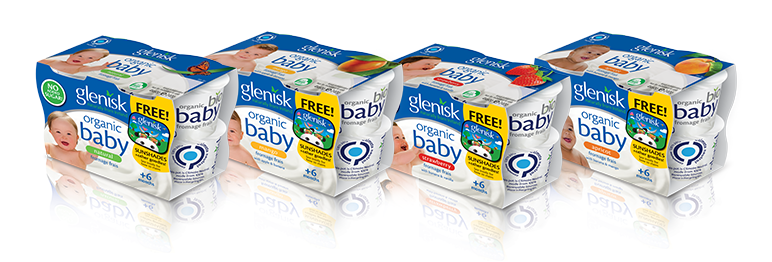solid advice: weaning your Baby
Aveen Bannon, Registered Dietitian and Consultant Nutritionist on Weaning onto solids.

window of
opportunity
Weaning onto solid foods is a critical nutritional and physiological stage in an infant’s life. Congratulations on reaching this important milestone with your little one! Most parents have lots of questions about this important developmental stage. Consultant dietitian Aveen Bannon has developed this guide with Glenisk to help answer some of these important questions.
when do i start??
Introducing solids into your baby’s diet is a vital step in ensuring all their nutritional needs are met, therefore allowing adequate growth and development. For most babies, the ideal time to begin weaning is close to 6 months (26 weeks). The weaning process should not commence before the baby is 4 months of age/17 weeks and not later than 6 months/26 weeks. The weaning period is seen as a ‘window of opportunity’ in that a variety of foods can be offered along with different tastes, textures, flavours along with rougher food consistencies in the later stages.
This is a completely new mystifying experience for your baby. Although sucking is a natural reflex, babies need to be ready to learn the new skill of pushing food to the back of their mouth with their tongues and swallowing. Choose a time of day when you can give plenty of time and energy to the task. Midday is usually considered a good time to start and if possible try to feed your baby at the same time daily to establish a routine. As babies are used to food coming in a steady stream they can find the gap between mouthfuls frustrating so it is a good idea to offer some milk before feeding so that they are not frantically hungry.
introducing solids
into your baby’s
diet is a vital step

other develpomental signs indicating your baby is ready to start weaing include;
- Your baby is sitting up and holding his or her head up. This means your baby will be able to sit in an upright position for feeding.
- If your baby is looking at or trying to grab food it could mean he or she is ready to move on to solids.
- If your baby is irritable when finished their milk feed and appears to be still hungry this is another indication that they may need more food.
- Your baby starts to demand feeds more frequently over a time period of more than one week.
- Chews and dribbles more frequently.
(FSAI 2012)
what will i start with?
- Initial foods to introduce can include pureed fruits and vegetables along with mashed potato or baby rice. Avoid adding butter, salt or salt derivative, sugar or any other processed addition to your baby’s foods. The initial consistency should be a thin puree and you can thicken this as the baby learns to take food from a spoon. Introduce one new food at a time every 2-3 days.
- As the weaning progresses aim to mince/mash the foods then in final stages a choppier consistency should be well accepted. By 7-8 months your baby will start to pick things up with her thumb and finger and transfer objects from one hand to another. This is a good time to encourage your baby to start feeding themselves by offering them finger foods between meals as snacks and offering them their own spoon while your feeding them. Slices of banana, fingers of toast, baby rusks or cubes of cheese are good examples to start off with. It will be quite a messy so be prepared! Sit with them while you offer them finger foods and never leave your child unattended at this feeding stage in case they begin to choke.
- Once a baby reaches 12 months they should be having a similar diet to the family and partake in all mealtimes. As babies have smaller stomachs than us and they do eat smaller portions so try to include regular healthy snacks in the diet for energy. About a third of their daily calories will come from snacks.


ideas for first weaning foods include;
- Baby rice;
- Baby porridge
- Puréed fruit e.g. apples, pears;
- Mashed potato or sweet potato with formula or breast milk
- Puréed vegetables e.g. broccoli, carrot, cauliflower, spinach, courgette, turnip, peas, beans and parsnip;
- Puréed well cooked meat, chicken or fish (all bones removed)
- Puréed peas and beans
From 6-9 months
- Yogurt, custard, fromage frais after 6 months
- Well cooked eggs
- Other breakfast cereals (low sugar options)
- Bread, pasta
- Cheese
- Pure nut butters (sugar and salt free)
From 9-12 months
- Increase variety of foods in diet…most family foods are now suitable.

what about gluten & allergens?
Following the six month stage, gluten can be introduced into the diet along with beaker cup use. New evidence suggests that gluten can actually be offered from 4 months and that this will not effect risk of develping coeliac disease. However large amounts of gluten should be discouraged in the first few months after introduction. When introducing gluten it is best to start with one serving twice in one week, then you can increase to 3 times the following week and so on.
Avoiding certain foods in the weaning diet to prevent allergy is not recommended. The Irish Food Allergy Netwrok (IFAN) state that there is no benefit in delaying the introduction of peanut. They state that peanut in soft forms along with cows milk, egg, fish and tree nuts, should be introduced into the diets of healthy infants. Cows milk can be introduced from 6 months added to foods in small quanitites or in the form of yogurt but should not be given as sole source of milk before 1 year. Good pracitse is to introduce these foods one at a time in case there is an allergy reaction so you can pinpoint which food was the problem.
what foods should avoid before 12 months?
- Added sugar, salt, gravies, packet sauces, stock cubes
- Honey is only safe from 12 months as there is a small risk of botulism
- Soft and unpasteurised cheeses e.g. blue cheese, brie
- Cow’s milk is not suitable as a drink before 12 months, but it can be taken mixed with foods after 6 months. However, it is better to mix expressed breast milk or formula milk with solids at the beginning.
- Hot spices
- Undercooked eggs
- Nuts: avoid whole nuts until the age of 5 years due to the risk of choking
- Processed meats such as ham, bacon, sausages and rashers. These meats are high in salt and contain additives which are unsuitable for infants (FSAI 2012)
- Liver as it contains too much vitamin A
- Bran is a very high source of dietary fibre. Large amounts of fibre can reduce the absorption of micronutrients such as iron, calcium and zinc and can be difficult for an infant to manage (FSAI, 2012)
- All teas, caffeinated, decaffeinated and herbal, should not be included in an infant’s diet. These fluids contain caffeine and tannins which reduce the absorption of important micronutrients such as iron and calcium (FSAI, 2012)
I’ve heard of baby led weaning…what is this??
Baby led weaning is when the baby is encouraged to self feed with solids rather than being spoon fed purees. We actually don’t thave a public heatlh policy on this in Ireland at the moment. Some thougths around this topic suggest that babies fed this way are more likely to eat more variery of foods and are less likely to be overweight. Others voice concerns around the nutritional adequacy of baby led weaning diets and that the babies may be underweight. More research needs to be done in the area and its impact on growth. If you want to consider baby led weaning I would suggest discussing with your GP, PHN or dietitian to ensure nutritional adequacy.
For more on Weaning check out Aveen’s Top 10 Weaning Tips.
References
HSE Nutrition Reference Pack 0-12 months 2016
ESPGHAN 2012
IFAN 2016
